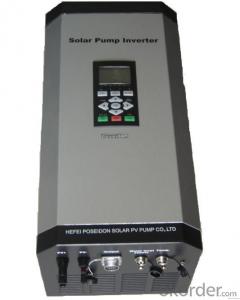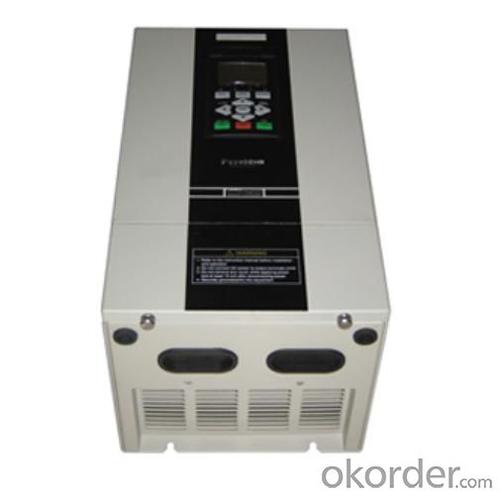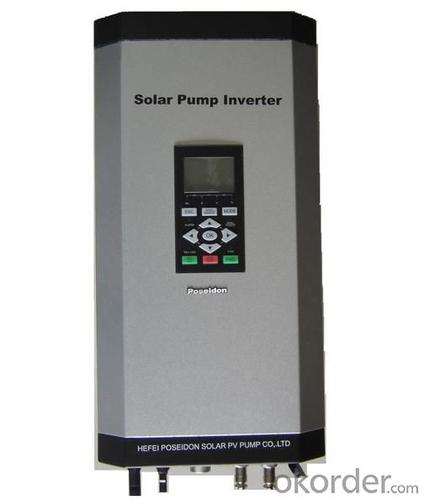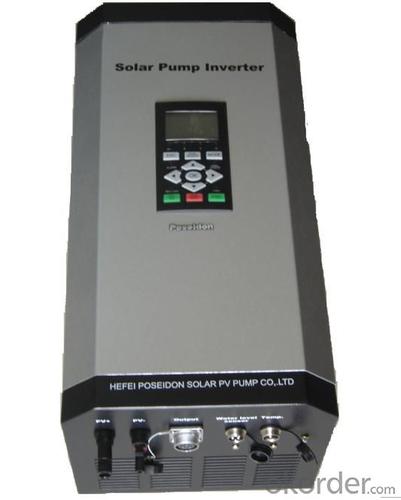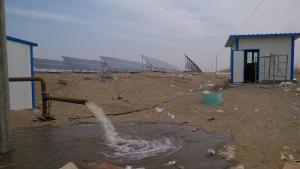Solar Pump Inverter FCPM22KH - Solar Pump Supplier
- Loading Port:
- China Main Port
- Payment Terms:
- TT OR LC
- Min Order Qty:
- -
- Supply Capability:
- -
OKorder Service Pledge
Quality Product, Order Online Tracking, Timely Delivery
OKorder Financial Service
Credit Rating, Credit Services, Credit Purchasing
You Might Also Like
Solar pump inverter FCPM22KH Product Description:
Solar water pumping system is constructed with solar panel array,solar pump inverter and AC water pump, DC current produced from solar panel will be delivered to solar pump inverter,and it will convert it into AC current to drive water pump,and will automatically regulate output frequency according to sun radiance intensity,maximally realize MPPT tracking function.
Features
Adopting the proposed dynamic VI maximum power point tracking (MPPT) control method, with fast response, and reliable operation, achieves efficiency of 99%.
Designed with variable frequency driver, greatly improves efficiency
Extremely high efficiency
Digital mode control, with automatic operation and manual operation mode options
Complete protection functions
Adopts intelligent IPM module, with high reliability
LCD display and operation panel, in real time presents operating data
Optional for water level measurement and control circuit
Applicable for general ACC pumps, like centrifugal pump, piston pump etc.
Independent intellectual property; Highly effective, the redundant reliability, exempts the maintenance and the long life.
The pumps are soft started, fully protected.
No batteries are used. So better Sunlight, more water.
Datasheet.
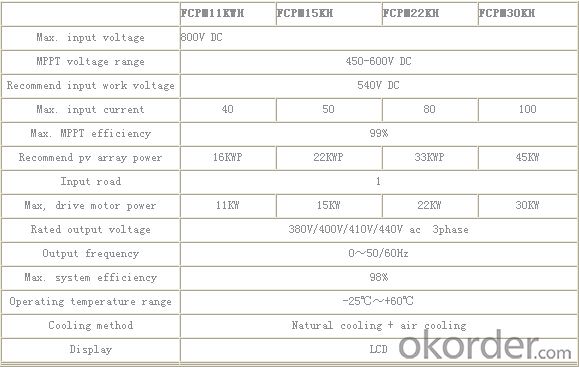
- Q: What is the maximum number of hours a solar pump can operate continuously?
- The maximum number of hours a solar pump can operate continuously is dependent on various factors such as the capacity of the solar panels, the battery storage capacity, and the efficiency of the pump system. However, in ideal conditions with sufficient sunlight and battery capacity, a solar pump can operate continuously for 24 hours a day.
- Q: How does a solar pump handle power fluctuations in the electrical grid?
- A solar pump is not affected by power fluctuations in the electrical grid as it operates independently using solar energy. It is not reliant on the grid for power supply, therefore, it can continue to function seamlessly even during power fluctuations or outages.
- Q: How does the size of a solar panel affect the performance of a solar pump?
- The size of a solar panel directly affects the performance of a solar pump. A larger solar panel can generate more electricity, which in turn provides more power to the pump, resulting in increased performance. A smaller solar panel, on the other hand, generates less electricity, limiting the power output and potentially reducing the performance of the solar pump.
- Q: Do solar pumps require batteries for storage?
- No, solar pumps do not require batteries for storage. Solar pumps are designed to operate directly using the energy generated from the sun. When the sun is shining, the solar panels convert sunlight into electrical energy, which is then used to power the pump. This allows the pump to work in real-time, pumping water directly from the source to the desired location, such as a reservoir or irrigation system. Since solar pumps do not rely on batteries for storage, they are typically more cost-effective and require less maintenance compared to pumps that utilize batteries. However, it is worth noting that some solar pump systems may include a small battery for short-term energy storage to ensure continuous operation during periods of low sunlight or at night.
- Q: Can a solar pump be used for water circulation in a pond or lake?
- Yes, a solar pump can be used for water circulation in a pond or lake. Solar pumps are designed to operate using energy from the sun, making them an eco-friendly and cost-effective option for water circulation. They can help improve water quality, prevent stagnation, and promote a healthy ecosystem in ponds or lakes.
- Q: Are there different types of solar pumps?
- Yes, there are different types of solar pumps available in the market. Some common types include submersible solar pumps, surface solar pumps, and floating solar pumps. These pumps are designed to cater to different water pumping needs and can be used for various applications such as irrigation, livestock watering, and water supply.
- Q: How does the efficiency of a solar pump compare to a diesel pump?
- The efficiency of a solar pump is generally higher than that of a diesel pump. Solar pumps utilize direct sunlight to generate electricity, which is then used to power the pump. This process is highly efficient as it directly converts solar energy into mechanical energy, resulting in minimal energy losses. On the other hand, diesel pumps rely on the combustion of diesel fuel to generate power, which is inherently less efficient due to energy losses in the fuel combustion process. Additionally, solar pumps do not require ongoing fuel costs and have lower maintenance needs compared to diesel pumps, making them a more cost-effective and environmentally friendly option in the long run.
- Q: What is the impact of a solar pump on poverty alleviation?
- A solar pump has a significant impact on poverty alleviation. By providing clean and reliable access to water for irrigation, it enables smallholder farmers to increase their agricultural productivity and income. This helps lift them out of poverty by reducing their dependency on rain-fed agriculture and increasing food security. Additionally, solar pumps eliminate the need for expensive diesel or electricity-powered pumps, reducing operational costs and making them more affordable for farmers in remote and off-grid areas. Overall, the use of solar pumps contributes to improved livelihoods, economic growth, and reduced poverty in rural communities.
- Q: Can a solar pump be used for water supply in schools or public buildings?
- Yes, a solar pump can be used for water supply in schools or public buildings. Solar pumps are cost-effective, environmentally friendly, and can provide a reliable and sustainable source of water. They can be installed in areas where electricity supply is limited or unreliable, and can effectively meet the water needs of schools and public buildings.
- Q: Can a solar pump be used in areas with low sunlight?
- Yes, a solar pump can still be used in areas with low sunlight, but its performance may be affected. The amount of sunlight directly influences the efficiency and output of a solar pump. In areas with lower sunlight, the pump may have reduced power and may not be able to operate at its maximum capacity. However, advancements in solar technology have made pumps more efficient, enabling them to operate even in areas with limited sunlight.
Send your message to us
Solar Pump Inverter FCPM22KH - Solar Pump Supplier
- Loading Port:
- China Main Port
- Payment Terms:
- TT OR LC
- Min Order Qty:
- -
- Supply Capability:
- -
OKorder Service Pledge
Quality Product, Order Online Tracking, Timely Delivery
OKorder Financial Service
Credit Rating, Credit Services, Credit Purchasing
Similar products
Hot products
Hot Searches
Related keywords


